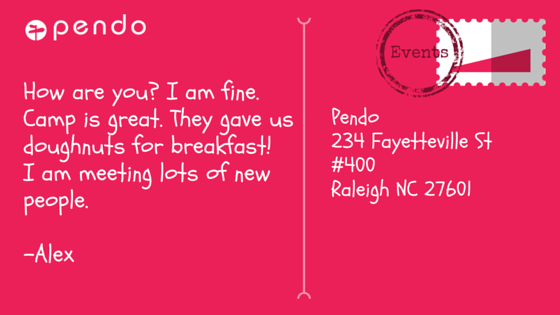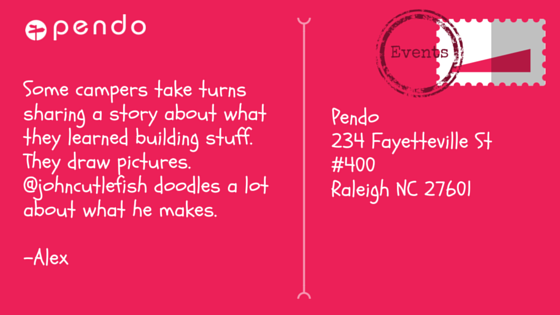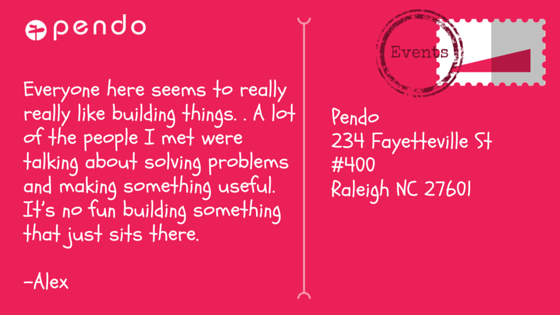I spent last weekend at ProductCamp LA. I’ve been to plenty of camps–sailing camp, YMCA camp, and leadership camp. It seems funny that we now have camps for grownups, let alone camps for product. But why not? Going to camp is fun! Bring on the s’mores!
It’s all about learning something new. And, camp is about getting away from home, and out of your comfort zone, to help you grow. So here you go, Mom! What I learned at camp this summer…
1. Product managers want to be better decision makers.
Most product teams aspire to be data driven but can struggle to change the culture within the company. This is a tough nut. It’s hard to change culture, and by association, it’s hard to change a process. People can be very cautious about change. Egos and territories are potential land mines in the business world.
Why don’t we treat software like sports and leverage data, like Moneyball? To do that, you’ll need stats to back up a change in an organization resists new tools or methods. So, how does 2x higher ARR sound? Yep, that’s what our survey of companies who actively track data reported. And if one thing generally speaks loudly in the boardroom, it’s money.
2. Product managers stick together.
The amount of ownership and pride the product community has in what they do is amazing and rare. The product community is a tight knit group. Collectively they all struggle with finding their niche fit. You have varying degrees of technical and non-technical product folks. Some product managers are inherently engineering focused and deal with technical efficiency. Others take more of a user-centric approach to product. And the reality is that many are somewhere in the middle.
But while the range of expertise varies, the level of commitment the product community exhibits at ProductCamp to both their users, their team, and their product(s) is simply overwhelming. They are happy to teach sessions and share their failures and successes equally. And they give each other support through product management MeetUps, conferences like Mind The Product, a host of online newsletters, like Bringing the Donuts and chat forums such as the Product Management HQ Slack Community.
3. Product managers love their job.
These people LOVE what they do. Yes, it’s frustrating. Yes, they often feel underappreciated and overwhelmed. And yes, there is a ton of pressure on them to figure out what makes their product the best. But, they love the high-energy atmosphere, the collaboration, the user interactions and the ability to make “something out of nothing.” The trade-off for all the pain is that moment when they start watching real users interact with the application, and soon thousands, perhaps millions of users are actually using the software. (Can you see why watching the events tracking is so addictive? It’s like a real-time report card for your application. One of our customers–TrendKite–actually had to turn the monitors off because people were too distracted watching NPS results come in.)
4. Product managers are problem solvers.
This selfishly just reinforces my opinion about our product. But it’s still refreshing to hear that the issues we say we hear from users actually exist in the real world with real people. I hear it in person at ProductCamps all the time. Access to product data is more than just a product management solution. It’s data that helps across engineering, product and customer success teams. Product managers want to be empowered without being tied to engineers. They love their engineering teams and good product managers want to take them out of the code as infrequently as possible. So when a product manager wants to know usage trends about a specific feature, he/she does not want to have to sneak up to an engineer stealth ninja-style and ask them to please stop that much-needed speed refactor, and tag a few features. It’s a lot easier when product can make thoughtful choices about which data questions to ask, and then answer them in Pendo without compromising engineering efficiency. And furthermore, data lets the product team know that they don’t need to prioritize enhancements to “feature A” because everyone bypasses it to go straight to “feature D”. Heck. The engineers can just deprecate “feature A” altogether. And that means less debt in the code. And that makes engineers happy.
5. Product managers aren’t the only problem solvers.
And since we’ve just made engineering happy, what about the customer success team? I hear about one-to-many needs from Customer Success MeetUps. Guides are one way to apply and collect data and take much needed one-to-many action. With the segmented data collected, (for example: show me all users who have logged in between last Monday and today) it’s possible for customer success to deploy guides targeted at those specific users to announce a new feature, highlight a marketing event or even alert them to features they may have overlooked. And the success team can do this without asking engineering to deploy new code, and without emailing or calling each individual user. Better, the success team can see whether or not those individuals actually interacted with the guide. And if you want to follow up on how your software is perceived, deploying a simple NPS survey is just as easy.
So while this wasn’t my first–and I’m sure it isn’t my last–ProductCamp, I continue to learn new things every time I meet new product managers. Their enthusiasm for their work makes me even more excited to share Pendo and all its capabilities with them. I know building new software is hard. And I love that our product makes that process a little easier, more predictable and definitely geared toward repeatable success. Send me an email and let me know how your product team uses data. I’d love to hear from you! And next time we meet at a ProductCamp, let’s make s’mores.
Alex Anderson is an Account Executive at Pendo and a former talk show host for Tennessee Sports Radio. (He bleeds Volunteer orange.) Sometimes we ask him to do a play-by-play of the office antics just for fun. To find out where Alex will be heading next, check out our upcoming events.








